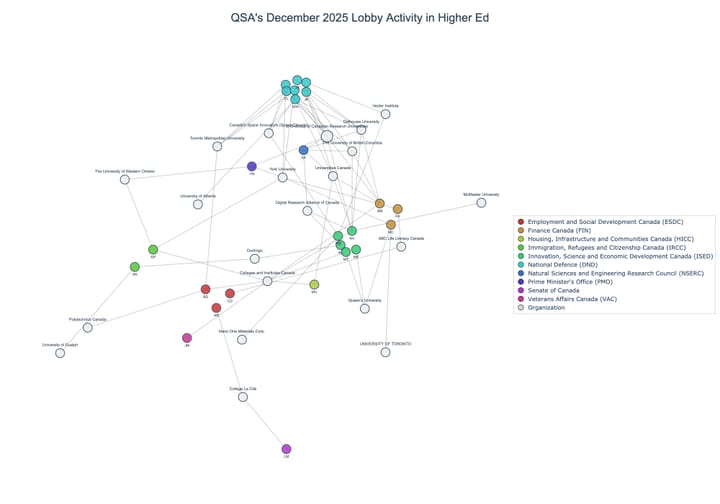QSA's Week in Higher Ed (#28, 2025)
CIHR appoints new institute director; World Youth Skills Day marked with student programs; Canada, EU advance industrial policy dialogue; AI-driven critical minerals partnership in NWT; Government publishes animal testing reduction plan; StatsCan debuts graduate mobility tool; US Education Dept. ...

Good morning! This is Queen Street Analytics' weekly roundup of regulatory developments, legislative discussions, political announcements and other government-related news concerning colleges, universities, campuses, research initiatives and funding, and the tri-council (CIHR, NSERC, SSHRC) agencies. Every Monday, we break down the most important updates in this space in under five minutes.
Want to see GR activities in areas of the economy related to the Higher Ed channel? Don’t miss this week’s updates in Social Issues and BioPharma.
Dates: 2025-07-13 to 2025-07-19
📋 In This Week's Newsletter
• 🇨🇦 Canadian Federal GR News
• 🇺🇸 US Federal GR News
• 🗺️ Canadian Provincial GR News
• 📚 What We're Reading This Week
Canadian Federal GR News
Dr. Rae Yeung appointed Scientific Director of CIHR Institute of Musculoskeletal Health and Arthritis
The Canadian Institutes of Health Research (CIHR) named Dr. Rae Yeung as the incoming Scientific Director of the Institute of Musculoskeletal Health and Arthritis (CIHR-IMHA), beginning October 1, 2025. Dr. Yeung, noted for her research in childhood inflammatory diseases, currently serves at the University of Toronto Temerty Faculty of Medicine and at SickKids Hospital. Her expertise covers precision medicine in childhood arthritis, and her tenure will see CIHR-IMHA headquartered at SickKids in Toronto. Dr. Yeung also coordinates the Understanding Childhood Arthritis Network (UCAN), linking over 50 countries in translational research. This appointment supports CIHR's focus on advancing research collaborations and clinical outcomes for musculoskeletal and autoimmune conditions.
Sources: Announcements: www.canada.ca

Government marks World Youth Skills Day with focus on digital and skilled trades programs
Secretary of State (Children and Youth) Anna Gainey recognized World Youth Skills Day by detailing federal support for youth digital skills and trades. Initiatives cited include the Student Work Placement Program, with projects in AI, cybersecurity, agri-tech, and more. Canada Summer Jobs continues to provide opportunities for youth aged 15 to 30, including in digital fields. The government described ongoing investments aimed at equipping young Canadians for roles in the evolving technology-driven workforce. Partnerships with industry organizations such as the Information and Communications Technology Council and Technation back tech-focused placements for post-secondary students.
Sources: Announcements: www.canada.ca
Canada and European Union launch new industrial policy dialogue
On July 11, Canada’s Minister of Industry Mélanie Joly met with the European Commission's Executive Vice-President Stéphane Séjourné to advance the New Canada–EU Strategic Partnership of the Future. Both parties agreed to establish a joint work plan and indicated an intention to reconvene within a month. The initiative, announced at the recent Canada–EU Leaders’ Summit, will target cooperation in areas tied to economic diplomacy, innovation, and job creation. Universities and research institutions engaged in European partnerships may anticipate new frameworks for collaboration as details are published.
Sources: Announcements: www.canada.ca
Canada and Northwest Territories launch AI-based core scanning for critical minerals development
Natural Resources Canada, in partnership with the Northwest Territories, announced a pilot project involving the digitization and AI analysis of historic drill cores. Focusing on the Slave Geological Province, core samples will be made available via a digital platform and analyzed for mineral potential with advanced techniques. The initiative aims to attract investment in critical minerals—lithium, copper, cobalt, and rare earths—while minimizing new land disturbance. The program is expected to lay groundwork for a Canadian Digital Core Library, supporting national priorities related to clean growth, research commercialization, and Arctic sovereignty.
Sources: Announcements: www.canada.ca
Canada launches $11.7M Wildfire Resilience Consortium with research and knowledge exchange mandate
Ministers Tim Hodgson (Energy and Natural Resources) and Eleanor Olszewski (Emergency Management and Community Resilience) announced an investment of $11.7 million over four years to establish the Wildfire Resilience Consortium of Canada (WRCC). The WRCC will serve as a national center of excellence and virtual hub, focused on advancing wildfire prevention, mitigation science, and technology. The consortium’s remit covers partnership building, Indigenous fire stewardship, and cross-sectoral collaboration, drawing on domestic and international expertise, including actions from the Kananaskis Wildfire Charter. Research institutions, universities, and private sector participants will have opportunities to engage in knowledge mobilization projects related to wildfire resilience and emergency management.
Sources: Announcements: www.canada.ca
Government publishes strategy to replace, reduce or refine vertebrate animal testing under CEPA
Health Canada and Environment and Climate Change Canada released a strategy detailing efforts to phase out vertebrate animal testing under the Canadian Environmental Protection Act, 1999 (CEPA). The approach includes identification of alternative test methods, advancement in research/data generation, harmonization, and implementation within CEPA regulatory programs. The strategy incorporates feedback from prior consultation periods and positions federal agencies to use non-animal alternatives where scientifically justified. Regulatory and academic researchers working in chemical safety and product testing can anticipate further updates as alternative method adoption progresses.
Sources: Gazette, Part I: www.gazette.gc.ca
Federal government outlines CEPA Plan of Priorities, enforcement of strengthened chemical management regime
The Canada Gazette published the federal Plan of Priorities under CEPA, substantiating the chemicals management reforms enacted by recent amendments. The plan details regulatory and voluntary mechanisms for risk reduction, expanded risk assessment criteria for persistent and bioaccumulative toxic substances, and planned launches of disclosure strategies for substances in products. It sets out the need for stakeholder engagement, cost-benefit analysis, and compliance promotion, with new permitting regimes for high-risk chemicals anticipated following consultation. Academic institutions investigating toxicology, risk assessment, and environmental health may observe updated regulatory requirements and collaboration opportunities.
Sources: Gazette, Part I: www.gazette.gc.ca
Statistics Canada launches graduate mobility visualization tool
Statistics Canada introduced an interactive tool that tracks the geographic mobility of Canadian graduates with bachelor’s degrees between 2012 and 2021. Users can view data by province of study to examine post-graduation retention and migration patterns. The visualization supports research and policy analysis related to workforce development, interprovincial mobility of talent, and outcomes for postsecondary institutions.
Sources: Open Government Data Set: www.statcan.gc.ca
US Federal GR News
President Trump announces over $92 billion investment in artificial intelligence and energy initiatives
President Donald J. Trump unveiled more than $92 billion in artificial intelligence (AI) and energy sector investments at the Energy and Innovation Summit in Pennsylvania. Key contributions include $25 billion from Google and $25 billion from Blackstone for data centers and energy infrastructure, as well as $6 billion from CoreWeave. Further commitments came from FirstEnergy with $15 billion for grid enhancements and Westinghouse for nuclear energy sector revitalization. The federal announcement emphasized ongoing efforts to reinforce U.S. leadership in AI, innovation, and advanced manufacturing. Energy and AI partnerships driven by these investments are expected to advance technology capacity with downstream implications for research institutions and industry partners in both countries.
Sources: White House Announcements: www.whitehouse.gov, White House Announcements: www.whitehouse.gov
Education Department announces new grant cycle for Transition and Postsecondary Programs for Students with Intellectual Disabilities (TPSID)
The U.S. Department of Education has opened applications for the next round of Model Comprehensive Transition and Postsecondary Programs for Students with Intellectual Disabilities (TPSID) grants. Eligible higher education institutions and consortia can apply through August 13, 2025. Up to 27 awards are anticipated, totaling $11.7 million, with maximum individual grants of $500,000 annually for five years. Funded programs are required to support enrollment, academic inclusion, socialization, work experience, individualized planning, and meaningful credential completion for students with intellectual disabilities. Grantees must demonstrate a 25% non-federal matching contribution and report on performance indicators related to student progress and outcomes.
Sources: U.S. Federal Announcements: www.federalregister.gov
Education Department seeks applications for TPSID Coordinating Center to advance national evaluation and technical assistance
In a parallel competition, the Education Department is inviting proposals for a single five-year, $2 million Coordinating Center (TPSID-CC) award. The TPSID-CC will serve as a technical assistance entity, develop an evaluation protocol, assist TPSID grant recipients, and report on outcomes for inclusive postsecondary programs for students with intellectual disabilities. Responsibilities cover mentoring, dissemination of research and best practices, longitudinal data collection, and convening of grantee institutions. The Center is expected to contribute to model criteria, accreditation standards, and analysis of funding streams. Eligible applicants must show expertise in higher education, intellectual disabilities, evaluation, and technical assistance.
Sources: U.S. Federal Announcements: www.federalregister.gov
Education Department initiates new awards under the Asian American and Native American Pacific Islander-Serving Institutions (AANAPISI) Program
The U.S. Department of Education is offering new five-year competitive grants under the AANAPISI Program, with applications due August 13, 2025. Funds, totaling $5.4 million, are available for Individual Development Grants (up to $500,000/year) and Cooperative Arrangement Development Grants (up to $600,000/year) to strengthen services for Asian American and Native American Pacific Islander students. Invitational priorities for this cycle include support for distance education, workforce preparedness programs, and the integration of artificial intelligence (AI) tools in teaching and student support. Grantees will be monitored on performance measures such as student retention and graduation rates.
Sources: U.S. Federal Announcements: www.federalregister.gov
Education Department opens grant competitions for Alaska Native, Native Hawaiian, and Native American-Serving Institutions
Grant competitions for the Alaska Native and Native Hawaiian-Serving Institutions (ANNH) Program and the Native American-Serving Nontribal Institutions (NASNTI) Program are now open. Individual Development and Cooperative Arrangement awards are available with project periods up to five years. ANNH is allocating $14.8 million, with individual grants up to $1 million/year and cooperative grants up to $1.5 million/year. NASNTI offers $4 million in total, with individual grants up to $600,000/year. Priorities for both programmes include distance learning, practical skills training, and AI integration. Key evaluation metrics focus on enrollment growth, student retention, and degree completion.
Sources: U.S. Federal Announcements: www.federalregister.gov, U.S. Federal Announcements: www.federalregister.gov
Canadian Provincial GR News
Ontario invests $5.4 million in agri-food research through provincial innovation alliance
Ontario is directing over $5.4 million to 28 agri-food research projects via the Agri-Food Innovation Alliance, supporting technology adoption and commercialization to help farmers and agribusinesses stay competitive.
Sources: Provincial Announcement: news.ontario.ca
Saskatchewan issues RFP for Research and Technology Park master plans to expand innovation capacity
Innovation Saskatchewan launched a request for proposals to develop long-term master plans for its Regina and Saskatoon Research & Technology Parks, aiming to increase capacity in specialized research infrastructure and strengthen partnerships with post-secondary institutions.
Sources: Provincial Announcement: www.saskatchewan.ca
Manitoba expands medical training capacity and science facilities in Brandon
The Manitoba government is adding 10 new physician training seats in Brandon and upgrading the Brodie Science Centre at Brandon University, creating additional pathways for local students pursuing health and science careers.
Sources: Provincial Announcement: news.gov.mb.ca
Alberta to begin regulating health care aides under new professional college structure
Alberta announced regulatory changes making it the first province to license health care aides through a professional college, with education requirements and standards effective February 2, 2026; this transition involves post-secondary partners in curriculum and compliance.
Sources: Provincial Announcement: www.alberta.ca
What We're Reading This Week
- Ontario to revamp college and university funding as early as next spring — and lifting tuition freeze may be on table: Ontario discusses plans to alter postsecondary funding models, with potential changes to tuition regulations.
- Ontario colleges have lost 600 programs and 10,000 workers over the past year. Here’s where the axes fell: Coverage of reductions in Ontario’s college workforce and program offerings in the past year.
- Georgian College becomes province’s first institution to operate Industry 5.0 sandbox: Georgian College launches an Industry 5.0 sandbox, noted as a first for Ontario.
- Western University launches program to capitalize on shrinking U.S. research funding: Western University debuts an initiative to attract research dollars amid declining U.S. funding streams.
- Virtual eksoUniversity to Support Continuing Education of PTs and PTAs Across the Country: A new virtual platform for physiotherapy continuing education is rolling out nationwide.
- Willis and the University of East Anglia launch wildfire risk partnership in response to escalating global threat: UK-based collaboration addresses wildfire risk and scientific research.
- University of Calgary launches new energy science program to respond to shifting industry: The University of Calgary introduces an energy science academic program aligned to industry changes.
- American College of Education Keeps Tuition Affordable with 'Online-First' Programs Built for Effective Learning and to Facilitate Career Progression: A U.S. institution utilizes online-first approaches to keep tuition costs down.
- Bitget Rolls Out Web3 Young Learners’ Encyclopedia to Schools, Libraries, and Beyond: Launch of a Web3 educational resource for the K-12 community.
- Western University launches program to capitalize on shrinking U.S. research funding: Light-format story on Western University’s new strategy targeting U.S. research funding declines.


